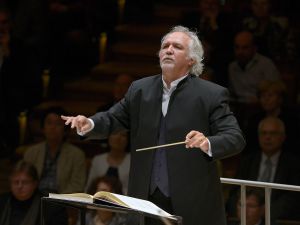Concert | Brahms / Schumann / Berlin-based orchestras
Orchester der Deutschen Oper Berlin
Matinee II

Donald Runnicles © Bettina Stöß
Originally conceived as a chamber music work when he composed it in 1858, Johannes Brahms only decided to adapt his Serenade in D major Op. 11 into an orchestral composition when his friend, the violinist Joseph Joachim, advised him to do so. The comment that the work was already a symphony was emphatically rejected by Brahms: “Oh God, if one dares to write symphonies after Beethoven, they must look very different.” 18 years were to pass until Brahms finally found the courage to present his First Symphony to the public. The composer’s level of self-doubt was, however, unfounded, as Brahms was declared Beethoven’s musical “heir” by the critics following the premiere of the First Symphony in 1876. The orchestra of the Deutsche Oper Berlin under general music director Donald Runnicles juxtaposes Brahms’ Serenade Op. 11, which orientated itself on musical paragons such as Haydn and Mozart, with Anton Webern’s “Im Sommerwind”, an idyll for large orchestras, which was still under the spell of the musical late Romantic period. Another aspect of 20th century music, which follows the tradition of the romantic Lied composition, is represented in this concert with Aribert Reimann’s “Drei Liedern”, which was composed in 1980 and is based on Edgar Allan Poe.
Anton Webern [1883-1945]
Im Sommerwind
Idyll for large orchestra [1904]
based on a poem by Bruno Wille
Aribert Reimann [*1936]
Drei Lieder for soprano and orchestra [1980/82]
based on poems by Edgar Allan Poe
I Sonnet-Silence “There are some qualities …”
II Dream-Land “By a route obscure and lonely …”
III To “I heed not that my earthly lot …”
Johannes Brahms [1833-1897]
Serenade No. 1 in D major op. 11 [1857/58]
Laura Aikin soprano
Orchester der Deutschen Oper Berlin
Donald Runnicles conductor
A Berliner Festspiele / Musikfest Berlin event
in cooperation with Deutsche Oper Berlin